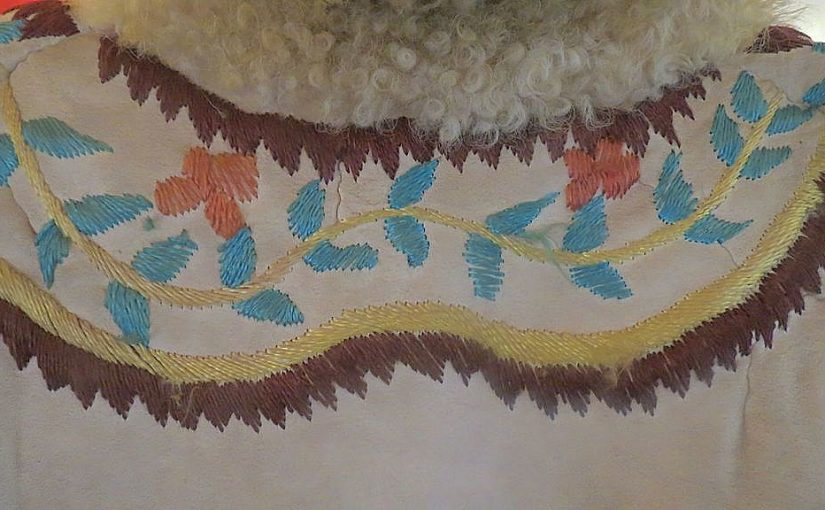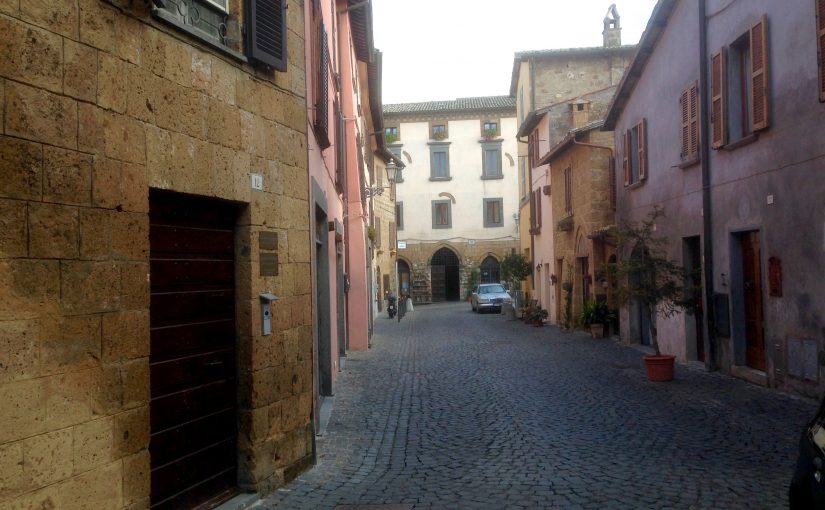Many years ago, I traveled for several weeks through Turkey with four guys from Germany. In Izmir, we visited the bazaar as they were eager to buy embroidered sheepskin coats, all the rage at the time for both men and women. But the coats were more expensive than they had been told to expect, so we wandered from stall to stall, window shopping, as it were. After a half hour or so a young man approached us. “Follow me, I’ll take you to the factory.” We looked at each other and shrugged. Why not? There are five of us, one of him, we’re probably safe. Ah, youth.
We followed him out of the bazaar and down a few blocks to a large five or six story building, up several long flights of stairs, and into a vast room where sheepskin coats were indeed being created. We were introduced to a man who seemed to be the owner. All the right biographical questions were asked in all directions, some in German, some in English. We were offered soft drinks and snacks, coffee and tea, as we sat on divans surrounded by hundreds of coats. For almost an hour, nothing was said of our reason for being there.
Then, on an invisible cue, the owner and his associates invited us to try on coats. Several were examined. Prices were quoted in the $250 – $300 range. That was rejected, and my friends began the apologies and shuffles of calling an end to the session. The owner, also most apologetic, began to show us out. Another man came over at a fast pace as if to deliver a message, and said something softly to the owner. “But wait, perhaps we can do something for you after all!” More snacks, more conversation, more drinks at divans. “So, what would you consider a favorable price?” Oh, a lot less than $250. “Well, try more coats, perhaps we will find a number you enjoy.”
This dance continued into the evening. After about four hours of chatting, eating, and trying on coats, my friends all walked out with one of their choosing; the top price paid – $18. The fellow we had met in the bazaar accompanied the five of us, victorious and giddy with our newfound skill at bargaining, down to the street. At the first landing, he drew us close in confidence. “You did okay, these are okay prices. But I am going to tell you a secret. In Turkey, never buy anything the first day. You paid double today what you would have paid tomorrow. You were too eager, and they took advantage of that.”
Orvieto, Italy 2016 is not Izmir, Turkey 1972, but I suspect I would not run afoul of custom were I to bargain at certain stalls at the market in Piazza del Popolo. Instead, as a native Californian anxious to be perceived as agreeable and open, when a price is quoted I say that it is a very good price indeed and pay it. In fact, compared to similar items I’ve bought in the past, the prices generally are good, but I suspect not quite as locked down as I take them to be.
The dance is alive here in other ways, too. An experience I had on the Gran Raccordo Anelare outside of Rome several years ago, still plays in my mind when I think of Italian culture. Something had caused a traffic jam, I forget what. All four lanes were slowed to a crawl. With no apparent signaling or confusion, the four lanes morphed into six, thereby allowing traffic to move at a slightly faster pace. When the source of the problem was reached, the six lanes re-morphed into five, circumvented the inconvenience, and stabilized at four. No panic, no alarm, no hysteria.
As an American Boomer, efforts on my parent’s part to teach me patience were ceaselessly countered by the burgeoning culture of distraction that surrounded me. So while I have always theoretically ascribed to the virtue of patience, its practice has been elusive. When something provokes, surprises, or intimidates me, I am more of the disposition to wade in without consideration for consequences, than I am to weigh in on the best approaches. There is, to be sure, an advantage at a certain point in learning a language, at least, to simply open your mouth and hope for the best. But there is also advantage in acknowledging the dance that is expected to happen, and not short-circuiting those expectations because I believe my view of what should happen to be so obviously “correct.” This applies to everything from buying a frying pan to trying out new words or making new friends. What seems spontaneous and open to me, is often perceived by others as suspiciously abrupt, or just plain odd. What seems like appropriate back and forth to others, feels like dragging of feet to me, or outright rejection.
I didn’t buy a sheepskin coat that day in Izmir because I was traveling with a backpack and had no desire to carry more than I already had. But in the next few months I did find a coat for about thirty-five dollars, though I cannot remember where. It was an affectation to have such a thing in Felton, California, where I lived at the time. Never did I use it for warmth. I wore very light clothes under the coat, left it open, and employed it for grand entrances. I imagine I looked pretty good with my long hair untied, sporting a pair of aviator shades, even at night.
In 1995, desperately missing Italian life, I organized what would become the first of various groups to spend a several weeks vacation or study trip in Italy. Because we were mostly Americans, my very slight blush of Italian usually made of me a group’s designated speaker. Like the coat, it was an affectation, but, also like the coat, an enjoyable one. In the process I picked up habits and words that do not exist outside of my mind.
Today in class, I ventured to use a slang I had heard somewhere (possibly in New Jersey, now that I think of it; not the best place to learn standard Italian) substituting the slightly too-formal word for food, cibo, with the imaginary slang, la mangia. Yes, you may use cose da mangiare as a more casual alternative, but la mangia, while hilarious and amusing, it is not at all useful. An affectation. Such a small thing, but seeing that bit of inaccurate arcana slide into the sea was as painful as it was a relief.
One night, my Felton housemates and I went dancing. I wore the sheepskin coat, and apparently cut quite a figure walking in for someone watching. We hung, had a couple of beers, dancing was done, and when we decided to move on the coat was no longer where I had left it. My friends were outraged. I had the same reaction as today when I lost my imaginary slang – with a dizzying mix of humiliation and relief, I watched as an affectation fell into the sea.
And so it goes in Orvieto. The experience of learning the cultural dance is as much a piecemeal letting go as it is a gradual taking on. I have a house and garden I love, and they are much, much smaller (and manageable) than anything I’ve had to reside in for fifteen years. Sometimes it startles me to be living so simply and precisely, but mostly I feel that once again I can breathe. What was all that acquisition about, anyway? Anything to do with the disquieting roar I keep hearing in the distance? Oh right, that is the sound of affectations crashing into the sea. Happily, I’m told they’re swiftly biodegradable.


